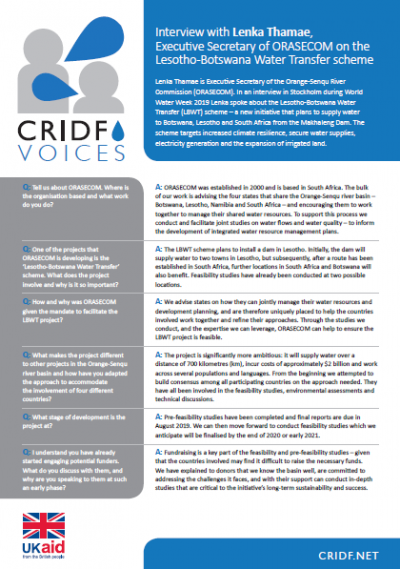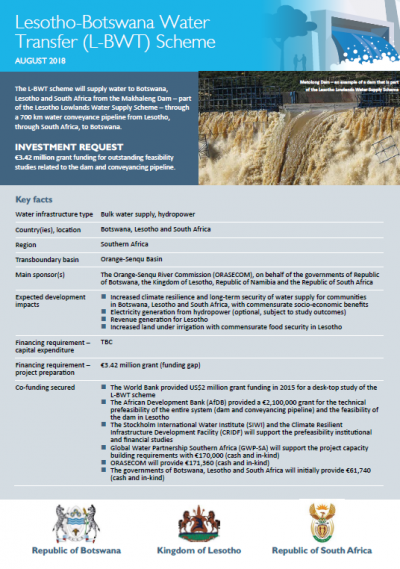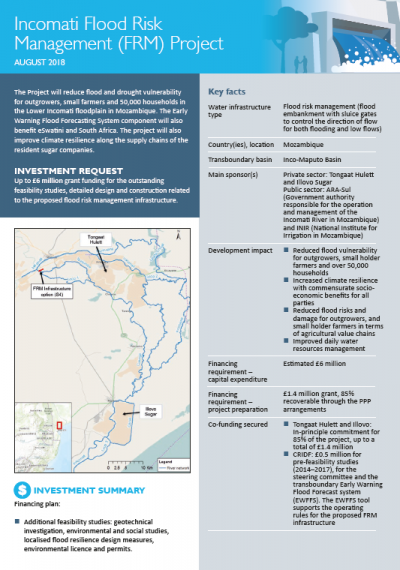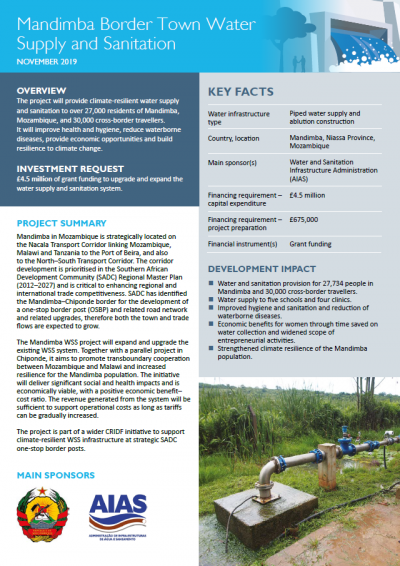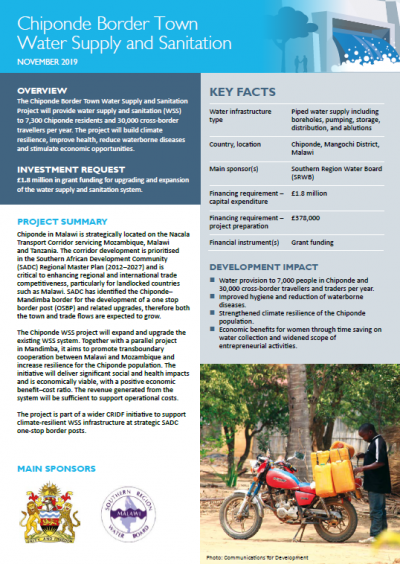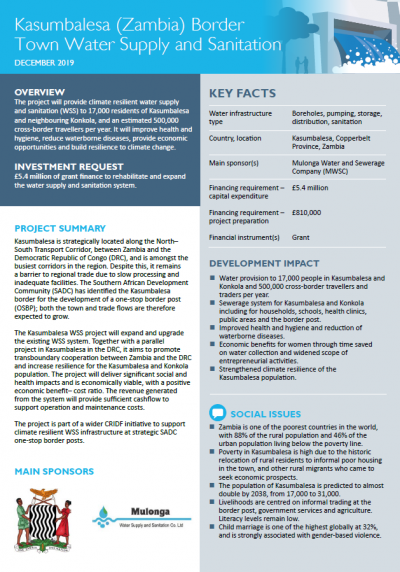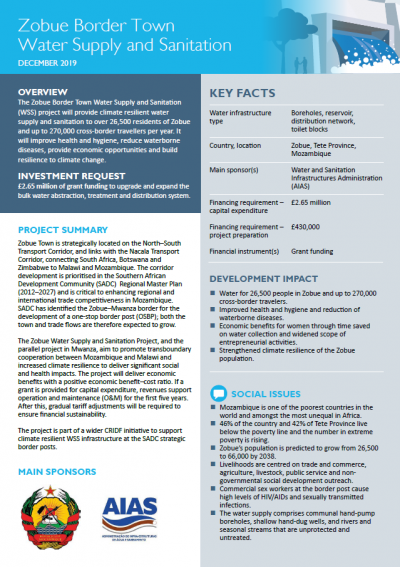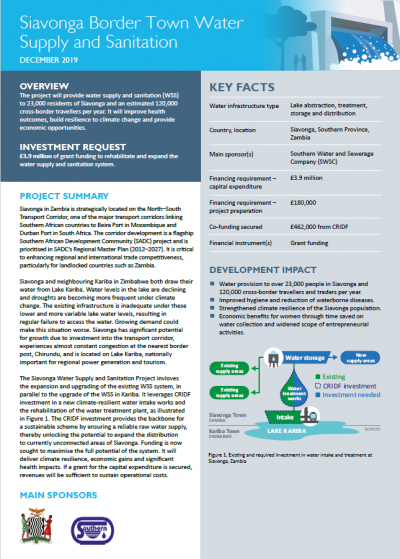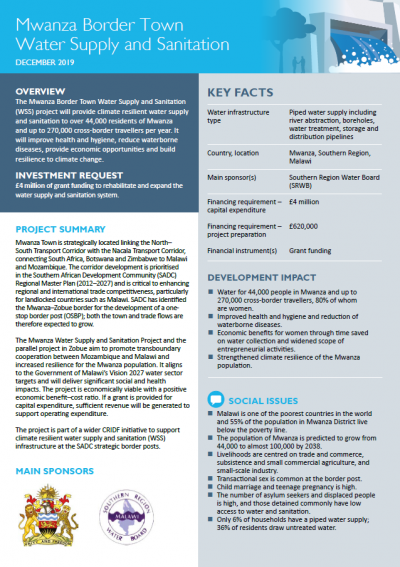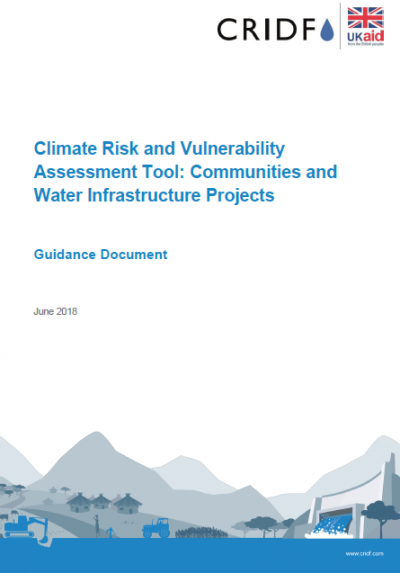All documents
CRIDF Voices provides a platform for leading figures in Southern Africa’s development community to share their perspectives on water-related issues and challenges. In this issue Lenka Thamae, Executive Secretary of the Orange-Senqu River Commission (ORASECOM), discusses the potential of the Lesotho-Botswana Water Transfer (LBWT) scheme. This new…
Year: 2020
Produced by: CRIDF
File size: 207 KB
The Lesotho-Botswana Water Transfer Scheme will supply water to Botswana, Lesotho and South Africa from the Makhaleng Dam – part of the Lesotho Lowlands Water Supply Scheme. This project pitch outlines the initiative’s expected benefits and key facts and figures to guide investment decisions.…
Year: 2020
Produced by: CRIDF
File size: 276 KB
The Incomati Flood Risk Management Project will reduce flood and drought vulnerability for smallholder farmers and 50,000 households in the Lower Incomati floodplain in Mozambique. In addition, an Early Warning Flood Forecasting System will benefit Eswatini and South Africa and enhance climate resilience along the supply chains of resident sugar companies.…
Year: 2020
Produced by: CRIDF
File size: 260 KB
The Mandimba Border Town Water Supply and Sanitation (WSS) project will provide climate-resilient WSS to over 27,000 residents of Mandimba and 30,000 cross-border travellers. It will improve health and hygiene, reduce waterborne diseases, provide economic opportunities and build resilience to climate change. This project pitch outlines the project’s…
Year: 2020
Produced by: CRIDF
File size: 300 KB
The Chiponde Border Town Water Supply and Sanitation (WSS) Project will provide WSS to 7,300 Chiponde residents and 30,000 cross-border travellers per year. It will strengthen climate resilience, improve health, reduce waterborne diseases and stimulate economic opportunities. This project pitch outlines the project’s expected benefits and key facts…
Year:
Produced by: 2020
File size: 296 KB
The Kasumbalesa Border Town Water Supply and Sanitation (WSS) project will provide climate resilient WSS to 17,000 residents of Kasumbalesa and Konkola, and an estimated 500,000 cross-border travellers per year. It will improve health and hygiene, reduce waterborne diseases, provide economic opportunities and build resilience to climate change. This…
Year: 2020
Produced by: CRIDF
File size: 200 KB
The Zobue Border Town Water Supply and Sanitation (WSS) project will provide climate resilient WSS to over 26,000 residents of Zobue and up to 270,000 cross-border travellers per year. It will improve health and hygiene, reduce waterborne diseases, provide economic opportunities and build resilience to climate change. This project pitch outlines the…
Year: 2020
Produced by: CRIDF
File size: 196 KB
The Siavonga Water Supply and Sanitation (WSS) Project involves the expansion and upgrading of the existing WSS system. It leverages CRIDF investments through a new climate-resilient water intake works and the rehabilitation of a water treatment plant – the backbone of a sustainable raw water supply system that enhances climate resilience and delivers…
Year: 2020
Produced by: CRIDF
File size: 208 KB
The Mwanza Border Town Water Supply and Sanitation (WSS) project will provide climate resilient water supply and sanitation to over 44,000 residents of Mwanza and up to 270,000 cross-border travellers per year. It will improve health and hygiene, reduce waterborne diseases, provide economic opportunities and build resilience to climate change. This…
Year: 2020
Produced by: CRIDF
File size: 192 KB
The Climate Risk and Vulnerability Assessment tool evaluates the climate risk and vulnerability of communities and water infrastructure projects, assessing the impacts of current and future climate hazards (temperature, rainfall, droughts and floods). The Tool also explores potential interventions that can help to strengthen climate resilience.…
Year: 2018
Produced by: CRIDF
File size: 1.54 MB


